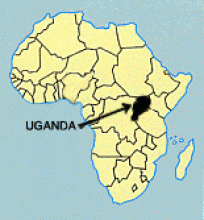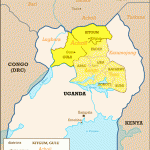Regional Background
Uganda is a country in East Africa, bordered on the east by Kenya, on the north by Sudan, on the west by the Democratic Republic of Congo, on the southwest by Rwanda, and on the south by Tanzania. The southern part of the country includes a substantial portion of Lake Victoria, within which it shares borders with Kenya and Tanzania. Uganda takes its name from the Buganda kingdom, which encompasses a portion of the south of the country including the capital Kampala. It has an estimated total population of about 27,616,000 people.
For almost 20 years in northern Uganda, a cult-like rebel group called the Lord's Resistance Army (LRA) has been waging war against the government and local Acholi people, launching horrific attacks on villages, towns and camps for the internally displaced. The group has abducted more than 20,000 children, forcing them to fight, carry ammunition and supplies and to serve as sex slaves for LRA commanders.
Many have been forced to perform terrible atrocities - including killing their families and other children - or face death themselves. Child soldiers have been estimated to make up 80 percent of the LRA's manpower; their experience is marked by kidnapping, rape, killings, ransacking and unimaginable war crimes as well as battling government forces. The rebels have targeted their own Acholi ethnic group, who are their main victims. About 90 percent (2 Million) of people in Acholiland (Gulu, Kitgum and Pader districts) live crowded into squalid settlements (Internally Displaced People’s camps) out of fear of the rebels, and the other half were forced into the camps by Ugandan soldiers where they lack food and clean water, are vulnerable to disease and LRA attacks that killed about 1,000 people a week. The United Nations calls it as one of the world's most neglected humanitarian crises.
The enlarged map at the right highlights Gulu, Kitgum,Pader and other districts in Uganda most severely affected by the conflict with the LRA.






